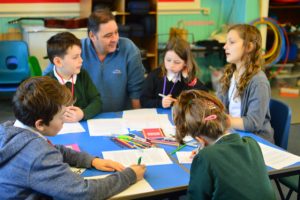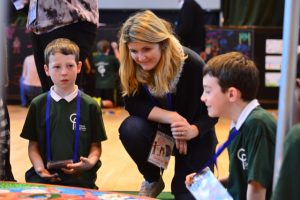Children’s Parliament has been increasingly engaging with the issue of attainment, particularly the poverty related attainment gap that so clearly spotlights inequality in our country. But why would a children’s human rights agency have anything to do with attainment?
engaging with the issue of attainment, particularly the poverty related attainment gap that so clearly spotlights inequality in our country. But why would a children’s human rights agency have anything to do with attainment?
Our starting points are articles 28 and 29 of the UNCRC, which describe the child’s right to an education. These are concerned with “The development of the child’s personality, talents and mental and physical abilities to their fullest potential”; although we have fallen short of full incorporation of the UNCRC into Scots Law (we live in hope, maybe one day) these articles, and specifically this language, are used in the Standard in Scotland’s Schools Act, so this right to an education is enshrined in Scots Law.
But then, what does this mean? The very fact that Scottish Government and partners have identified the attainment gap experienced by children from our most disadvantaged communities recognises that there are specific and complex barriers for some children. We need to understand and overcome these barriers before we can ensure their experience of school and of learning meets the standard we have set for ourselves.
The question then arises of course, how do we do that? From the start of this specific national focus on attainment, initially through Raising Attainment for All, we at Children’s Parliament were impressed by the improvement methodology being used; we could see how there was better use of data, how small step changes were being made, and then we were hearing about some of the challenges being faced in terms of scaling up the work. But when we observed this work, including via some of the short films produced by Scottish Government, what we were seeing wasn’t just a technical, functional process or approach, we were watching a relationship change. We were witnessing children, often individually, having a dialogue with a caring, listening adult, learning together and building confidence and skills. However, again as observers, as we watched this, we weren’t hearing that this was being recognised or valued.

What we knew already from our 20 years of practice was being affirmed, for us relationships matter. We already know that relationships defined by respect, empathy and human dignity (what we call rights-based relationships) are those which can have a powerful impact. So, why not be more explicit about making our learner/teacher relationships rights-based?
Then, again looking for a way in to this important work, we also considered, what aspects of these relationships might we usefully change? It seemed to us as we watched the raising attainment work that within the learner/teacher relationship we could do more to foster a dialogue about learning and about being a learner. Of course, teachers are more evidently articulating learning intentions, they are encouraging children to do their best; but what if as a child you just don’t understand how to be a learner, what if you have already come to believe somehow that you just can’t succeed with learning, or that learning isn’t for you? In such circumstances having the right to an education is meaningless, because barriers to the fulfilment of that right, to have that right as your lived experience, are already established.
What this takes us to is the idea of academic or learner self-perception. In 1954 Paul Eiserer wrote ‘A child’s learning is directly influenced by the way he feels about his school and his teacher. How can school and home, working together, develop more favourable attitudes on the part of children?’ and more recently Bob Burden recognised that ‘Ability alone is not enough: how we think about ourselves matters too.’ With this in mind Children’s Parliament has been creating new ways to engage learner and teacher (or any adult who facilitates learning) in positive, creative conversations about learning. Children discover their learning treasures, that learning happens everywhere and every day, that they have and can build competence and capacity as a learner.
 Learning, like play, is a joyful, natural, challenging and complex activity. When we adults fulfil our duty to engage the learner with dignity and respect we find ourselves in a better place to address the attainment gap we are so worried about.
Learning, like play, is a joyful, natural, challenging and complex activity. When we adults fulfil our duty to engage the learner with dignity and respect we find ourselves in a better place to address the attainment gap we are so worried about.
– Colin Morrison, Co-Director, Children’s Parliament
To find out more about how Children’s Parliament has been engaging with the Scottish Attainment Challenge see our project Children’s Parliament Investigates Learning…